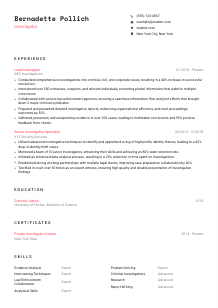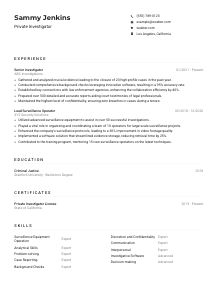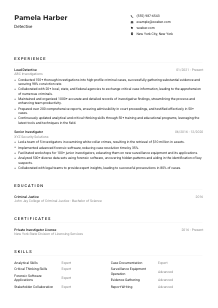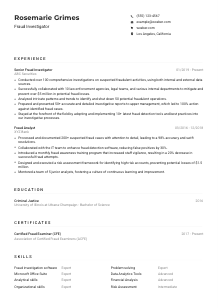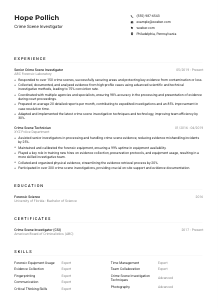Investigator Resume Example
Sleuthing out leads, but your resume case is unresolved? Dive into this Investigator resume example, pieced together with Wozber free resume builder. Discover how to present your analytical acumen and investigative prowess to align with job demands, turning your career narrative into a case closed!
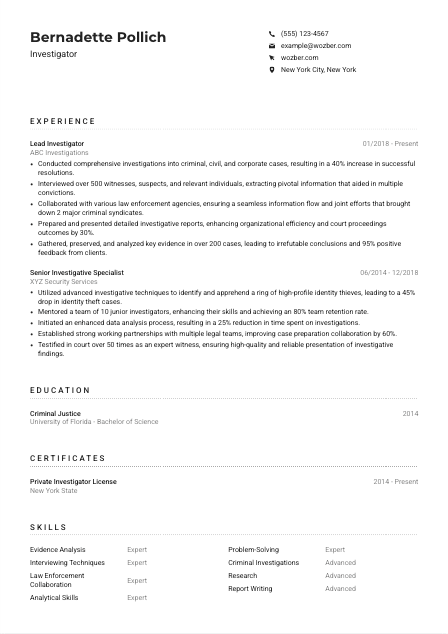
How to write an Investigator resume?
Embarking on the journey to clinch that Investigator role you've been eyeing? Your resume is your private investigator, keenly unraveling the storyline of your professional life to intrigue hiring managers. With the precision of a forensic expert, we're diving deep into how to craft a resume that shouts 'case closed' for your job hunt, all through the magic of Wozber's free resume builder. From utilizing an ATS-friendly resume format to engaging the ATS resume scanner for optimization, get ready to transform your career narrative into a compelling dossier that lands you the Investigator job you deserve.
Personal Details
In the mystery of making your first impression, the personal details section is your opening statement. This is where you brandish your professional identity. Let's tailor this section meticulously to elevate your candidacy for the Investigator position, ensuring every detail harmonizes with the role's prerequisites.
1. Your Name: The Lead Detective
Imagine your name as the neon sign that draws attention. It's paramount to ensure it's legible and prominent, shining bright at the top of your resume. Think of it as declaring, "This is the Investigator you've been searching for."
2. Your Title: Badge of Honor
Directly beneath your name, badge your resume with the title 'Investigator.' This signals to the hiring manager right off the bat that you're not just a contender; you're the solution to their case.
3. Contact Info: The Hotline
Your phone number and email are your hotline to the recruiter. Ensure these are correctly listed without a single typo. Consider an email format that's professional and straightforward, ideally leveraging your name for easy recall.
4. Location: Your Territory
"Located in New York City, New York" assures you're in the right jurisdiction for the role, matching one of the primary requirements head-on. It's like saying, "No need to send out a search party; I'm right here where you need me."
5. Professional Presence: Your Digital Footprints
If you have a LinkedIn profile or a professional website that showcases your sleuthing accomplishments or your network within law enforcement and investigative communities, include it. Make sure it's a reflection of your resume, with no discrepancies between the two.
Takeaway
Think of the Personal Details section as your opening argument in court. It must be sharp, relevant, and undeniably professional. As you craft this section, remember you're setting the tone for the narrative ahead. Use precision and make every detail count.





Experience
The experience section is where your resume's investigation deepens. Here, we unveil your track record of sleuthing successes. Tailoring this section to reflect your hands-on engagement in investigations and collaborations with law enforcement mirrors the job description's call for a seasoned Investigator.
- Conducted comprehensive investigations into criminal, civil, and corporate cases, resulting in a 40% increase in successful resolutions.
- Interviewed over 500 witnesses, suspects, and relevant individuals, extracting pivotal information that aided in multiple convictions.
- Collaborated with various law enforcement agencies, ensuring a seamless information flow and joint efforts that brought down 2 major criminal syndicates.
- Prepared and presented detailed investigative reports, enhancing organizational efficiency and court proceedings outcomes by 30%.
- Gathered, preserved, and analyzed key evidence in over 200 cases, leading to irrefutable conclusions and 95% positive feedback from clients.
- Utilized advanced investigative techniques to identify and apprehend a ring of high‑profile identity thieves, leading to a 45% drop in identity theft cases.
- Mentored a team of 10 junior investigators, enhancing their skills and achieving an 80% team retention rate.
- Initiated an enhanced data analysis process, resulting in a 25% reduction in time spent on investigations.
- Established strong working partnerships with multiple legal teams, improving case preparation collaboration by 60%.
- Testified in court over 50 times as an expert witness, ensuring high‑quality and reliable presentation of investigative findings.
1. Scene of the Crime: Job Requirements
Begin your investigative work by dissecting the job description. Highlight key experiences it demands, such as conducting various investigations, evidence analysis, and collaboration with law enforcement.
2. Your Investigations: The Cases You've Cracked
Format your experience in a reverse-chronological layout, leading with your most recent role. For each position, lay out your title, the precinct (company), and your tenure there. Then, it's storytelling time—chronicle your detective tales with bullet points that resonate with the job's needs.
3. Evidence Gathered: Quantifiable Success
Nothing speaks to your investigative prowess like cold, hard facts. Whenever possible, quantify your achievements. Perhaps you brought down criminal syndicates or boosted case resolution rates—let those numbers testify to your effectiveness.
4. Relevance: Stick to the Plot
Just as a detective doesn't get sidetracked by unrelated clues, ensure every bullet point directly supports your candidacy for the Investigator role. Tailor each statement to echo the job description's specific requirements.
5. Collaborations: Your Allies in Justice
Detail your partnerships with law enforcement agencies, legal teams, and other key players. Highlighting successful collaborations showcases your ability to be a team player in the complex world of criminal justice.
Takeaway
The experience section is your dossier of solved cases. It's here you demonstrate your investigative mastery and ability to deliver justice. This section is your proof of evidence that you're the investigative force the hiring team needs. Showcase your victories with pride and precision.
Education
Your educational background lays the groundwork for your investigative career. For the Investigator position, aligning this section with the job's specified requirements demonstrates your preparedness for the role. Let's scrutinize how to polish this section in your favor.
1. Uncovering the Degree
First, confirm the academic credentials the job lists as must-haves. Notably for an Investigator, degrees in Criminal Justice, Forensic Science, or related fields are often sought after. Place your matching degree front and center.
2. The Institution: Where You Trained
Keep it straightforward—list the field of study, your degree, the academy (university), and the year you graduated. Think of it as citing the origin of your investigative skills.
3. Specialized Training
If your degree aligns directly with the job's specifications, as in having a Bachelor of Science in Criminal Justice, make sure this is highlighted prominently. This isn't just an education; it's the birthplace of your investigative career.
4. Relevant Coursework & Achievements
While our example might not need this, mentioning specific courses or achievements can be beneficial, especially for roles demanding a certain expertise. For instance, a forensics course could be a testament to your attention to detail and analytical skills.
5. Your Educational Allies
Any extracurricular involvement—be it clubs, organizations, or honors—related to criminal justice or investigation, serves as further proof of your commitment and expertise. However, gauge the relevance based on your career level; senior roles might focus more on field experience.
Takeaway
Your education section is not just a list of schools and degrees; it's the foundation of your investigative career, showcasing your readiness to delve into complex cases. By closely aligning it with the job requirements, you reinforce your qualification for the Investigator position.
Certificates
In the realm of investigation, the right certifications can be as crucial as your detective's badge, substantiating your expertise and adherence to legal and procedural standards. Let's dissect how selecting and presenting your certifications can make your resume more compelling.
1. Decoding the Requisites
While the job description may not spell out specific certifications, showcasing relevant credentials illustrates your commitment to the profession. It tells a story of continual learning and expertise.
2. Exhibition of Credentials
Choose certifications that amplify your suitability for the Investigator role. The inclusion of a "Private Investigator License" and "Certified Fraud Examiner (CFE)" certification, as seen in our resume example, directly correlates with the professional experience and proficiency expected.
3. Timestamps of Professional Growth
If applicable, include the acquisition or renewal dates of your certifications to demonstrate your current competence and ongoing commitment to professional development.
4. Commitment to Evolution
The investigative field is constantly evolving, with new techniques and technologies emerging. Regular updates to your certifications not only keep you at the forefront of the profession but also signal your dedication to maintaining high standards of investigative practice.
Takeaway
Your certifications section is more than just a checklist; it's a display of your commitment to professional excellence. Each certification you include is a testament to your expertise, marking you as a prime candidate for the Investigator role. Keep your professional toolkit sharp and up-to-date.
Skills
The Skills section of your resume is like revealing the contents of your detective kit: every tool is chosen for its relevance to the job at hand. For an Investigator, showcasing a mix of hard and soft skills demonstrates your versatility and readiness to tackle any case. Let's fine-tune this section to leave a powerful impression.
1. Deciphering the Job Description
Start by identifying the specific skills the job posting emphasizes. Whether it's "strong analytical and research skills" or "excellent communication abilities," your resume should reflect these requirements to show you're in perfect alignment with the role.
2. Selecting Your Tools
Focus on listing skills that resonate most with the Investigator role. Leveraging both the hard skills like "Evidence Analysis" and soft skills such as "Problem-Solving" directly from our job description ensures you're speaking the same language as the employer.
3. Organization and Impact
Resist the urge to flood this section with every skill in your repertoire. Instead, prioritize those that make you a standout candidate for an Investigator position. A well-organized and thoughtfully selected set of skills invites the reader to recognize your value instantly.
Takeaway
Your skills are the gears in your investigative machine, each playing a critical role in solving the case. Presenting them prominently and in alignment with the job's requirements underlines your readiness and suitability for the Investigator role. Keep your arsenal sharp, and never stop adding to it.
Languages
In the multifaceted world of investigations, linguistic prowess can be a key asset, opening doors to cross-border collaborations or helping you connect with witnesses and suspects who speak different languages. Tailoring the Languages section of your resume for the Investigator role can cast you as a global sleuth ready for any challenge.
1. Meeting the Prerequisites
The job description emphasizes "English proficiency" as a fundamental requirement. Make this the cornerstone of your Languages section, clearly stating your fluency level to assure hiring managers of your ability to communicate effectively in the primary language of operation.
2. Additional Linguistic Skills
Beyond the prerequisites, listing other languages you're fluent in, like Spanish in our resume example, illustrates your capacity to navigate diverse environments and broaden the scope of your investigative capabilities.
3. Honesty in Proficiency
Clearly articulate your level of proficiency for each language listed. Whether you're "Native," "Fluent," "Intermediate," or "Basic," transparency ensures that your linguistic skills are accurately represented and can be relied upon in professional settings.
4. The Global Investigator
For roles that might involve international liaison or dealing with non-English speaking communities, your multilingual abilities highlight your versatility and adaptability as an Investigator, propelling you as a candidate of choice for dynamic, global cases.
5. Continuous Learning
Language skills are like clues—there's always more to uncover. Emphasize your commitment to learning and improving your linguistic capabilities, demonstrating an openness to engage with new cultures and perspectives in your investigative work.
Takeaway
Being multilingual in the world of investigation is akin to having a universal badge, granting you access to a wider range of cases and interactions. Flaunt your linguistic abilities as part of your professional identity, opening doors to a realm of global opportunities.
Summary
Just as the summary of a case file provides a snapshot of the investigation, your resume summary offers a brief yet impactful glance at your professional storyline. Crafting a summary that aligns with the Investigator role demands precision and a flair for highlighting your unique contributions to the field.
1. Capturing the Essence
Begin by absorbing the essence of the job requirements. Synthesize this into a potent introduction that sets the stage, indicating right from the start why you're the ace Investigator they've been seeking.
2. Your Professional Identity
Lead with a statement that encapsulates your investigative philosophy and career achievements. Mention your years of experience, specialty areas, and any notable successes that align with the demands of the job.
3. Spotlight on Abilities
Briefly list a few key skills and how they've propelled your career forward. Quantifiable achievements and recognition lend credence to your claims, painting a picture of an Investigator whose expertise is both deep and broad.
4. Brevity Is Key
While it's tempting to detail every triumph, remember, the summary is just the teaser. Aim for a concise narrative that entices the hiring manager to delve deeper into your resume.
Takeaway
Your resume summary is your chance to make a compelling opening argument for why you're the best candidate for the Investigator role. By tailoring it to the job's requirements, you set the tone for a resume that's both engaging and persuasive. Let your summary be the hook that leaves them wanting more.
Solving the Case: Launching Your Investigator Career
With your resume now expertly tailored using Wozber's free resume builder, including its ATS resume scanner for keyword optimization and ATS-friendly resume template for design, you're equipped to tackle the job market with confidence. Your resume is more than a document; it's a testament to your investigative prowess, a narrative that compellingly argues your case. So gear up, future Investigator, for a career that's about solving puzzles, uncovering truths, and making an indelible mark on the world.
The stage is set; the spotlight is yours. Go forth and claim your role in the annals of investigative excellence.

- Bachelor's degree in Criminal Justice, Forensic Science, or a related field.
- Minimum of 5 years of experience in law enforcement, private investigations, or a related field.
- Possess or be able to obtain relevant state-specific investigative licenses or certifications.
- Strong analytical, research, and problem-solving skills.
- Excellent written and verbal communication abilities.
- English proficiency is a fundamental requirement.
- Must be located in New York City, New York.
- Conduct thorough investigations into various cases, including but not limited to criminal, civil, and corporate matters.
- Gather, preserve, and analyze evidence to support investigative findings.
- Interview witnesses, suspects, and other individuals relevant to the investigation.
- Prepare detailed investigative reports and presentations for organizational use or court proceedings.
- Collaborate with law enforcement agencies, legal teams, and other stakeholders to ensure the integrity and validity of investigations.





